Myanmar willing to take back all 700,000 Rohingya
Myanmar is willing to take back all 700,000 Rohingya Muslim refugees who have fled to Bangladesh if they volunteer to return, the country's National Security Adviser Thaung Tun said yesterday.
He was speaking at the Shangri-La Dialogue, a regional security conference in Singapore, where he was asked if the situation in Myanmar's Rakhine state, where most Rohingya live, could trigger use of the Responsibility to Protect (R2P) framework of the United Nations, reports Reuters.
The so-called R2P framework was adopted at the 2005 UN World Summit in which nations agreed to protect their own populations from genocide, war crimes, ethnic cleansing and crimes against humanity and accepted a collective responsibility to encourage and help each other uphold this commitment.
"If you can send back 700,000 on a voluntary basis, we are willing to receive them," Thaung Tun said. "Can this be called ethnic cleansing?
"There is no war going on, so it's not war crimes. Crimes against humanity, that could be a consideration, but we need clear evidence. These serious charges should be proved and they should not be bandied about lightly."
International relations experts and Rohingya, however, termed such remarks as nothing but a stunt by Myanmar authorities, who have been denying citizenship and basic rights, including right to higher education, healthcare and free movement of Rohingya since 1982.
Since August 2017, about 700,000 Rohingya Muslims have fled a military crackdown in mainly Buddhist Myanmar, many reporting killings, rape and arson on a large scale, U.N. and other aid organisations have said.
The United Nations and aid agencies have described the crackdown on the Rohingya as "a textbook example of ethnic cleansing", an accusation Myanmar rejects.
Doctors Without Borders said at least 6700 Rohingya were killed in a month since the crackdown began on August 25 last year.
In various waves of influx, hundreds of thousands of Rohingya fled to Bangladesh since 1980s. Though many of them returned to Rakhine, many others remained back. Before the latest influx, there were over 300,000 Rohingya in Bangladesh.
The three major aspects that Rohingya want to be assured are citizenship, security and that they want to return to their homes, not to the camps that Myanmar authorities are building.
“The Myanmar official talked of voluntariness. This is actually a tactic because they have not created the conditions for voluntary return. That has to be done first,” said Asif Munier, an independent researcher on migration and refugee issues.
Myanmar insists that the Rohingya have to accept the national verification cards (NVC), which it says is a pathway to citizenship.
Rohingya, on the other hand, say accepting NVCs means they are migrants from Bangladesh and that they will not be recognized as citizens. Those who had accepted NVCs earlier faced similar challenge in the past.
“Over the years, the Myanmar authorities did not try – both in policy and at enforcement level – to create an environment of peaceful coexistence between the Rohingya and other groups,” Munier told The Daily Star by phone yesterday.
Rather, Myanmar made the Rohingya inferior through discriminations.
Asif Munier said the Myanmar official talked about evidence of crimes against humanity, but interestingly the authorities there have not allowed the UN Fact Finding Mission to Myanmar, independent journalists or rights groups to Rakhine.
Even Myanmar has not allowed full access to the UN and other aid agencies. On Thursday, Myanmar has approved texts of an agreement with UN Refugee Agency and UN Development Programme and is likely to sign it in a week or so to eventually allow the Rohingya sheltering in Bangladesh to return safely and by choice.
Myanmar also said it would set up an independent commission to investigate "the violation of human rights and related issues" in Rakhine State following the army operation there in response to attacks by Rohingya insurgents on security posts.
Thaung Tun said that the narrative of what happened in Rakhine was "incomplete and misleading".
"Myanmar does not deny that what is unfolding in northern Rakhine is a humanitarian crisis," he said. "There is no denying that the Muslim community in Rakhine has suffered. The Buddhist Rakhine, Hindu and other ethnic minorities have suffered no less."
He said that while the military had the right to defend the country, if investigations showed they had acted illegally, action would be taken.
Asif Munier said there are ample evidence of mass murders, rapes and other forms of tortures. The Rohingya villages were burned and then bulldozed reportedly to destroy the evidences.
“There will be no dearth of evidences to prove Myanmar's ethnic cleansing and crimes against humanity,” he added.
For now, of course, the major condition for return would be reviewing Myanmar's citizenship law, taking the Rohingya to their homes and ensuring full security for them once they get back home.

 For all latest news, follow The Daily Star's Google News channel.
For all latest news, follow The Daily Star's Google News channel. 

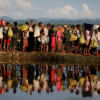
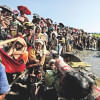
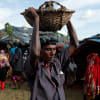
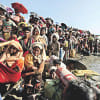
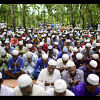


Comments